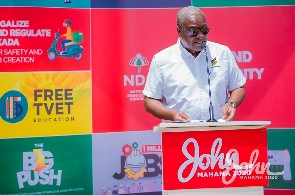 Flagbearer of the NDC, John Dramani Mahama
Flagbearer of the NDC, John Dramani Mahama
Ghana, one of Africa’s most stable democracies goes to the polls in December 2020 to elect a president and lawmakers. It is the eighth consecutive vote that has been held since the return to multi-party democracy in 1992.
Electioneering has undoubtedly evolved over the years. One of the main assets of campaigns being manifestoes – the document based on which party aspirations are laid out and with which they are held accountable periodically.
The 2020 campaign is no different, with the two major parties having unveiled their manifestoes. The issues therein as usual span service and infrastructure delivery promises and governance ideas and visions.
As a 2020 Paradigm Initiative digital rights fellow, this writer zones in on the digital footprints of opposition National Democratic Congress, NDC; led by former president John Dramani Mahama. A subsequent review will look at the ruling New Patriotic Party, NPP’s digital plans, pledges and postures.
A digital start
Right from the get-go; the manifesto’s introduction message pledges “digital transformation,” whiles in his foreword candidate Mahama says: “we must build a knowledge-based economy and move faster into the new world of smart manufacturing and digital services.”
The word “digital” appears a total of 44 times in different contexts throughout the 143-page document dubbed “Jobs, prosperity and more – The People’s Manifesto.”
The areas of focus remained varied spanning the finance, education, health, creative arts, agriculture, the judiciary, government services, private sector and digital inclusion sectors of the economy.
The NDC touts its achievement in the digital space during the first term of the Mahama administration (2016 – 2020) whiles promising largely to increase investment and support for people operating in the digital ecosystem.
One of the major promises in the document falls under the $10m Big Push infrastructure agenda under which the NDC is promising to “develop regional digital and innovation centers.”
The digital zone of the NDC manifesto
Still under the Big Push umbrella, the NDC states its commitment to developing a digitally functional economy. “Undoubtedly digital infrastructure is the bedrock of every digital economy,” the party stressed.
“… the COVID-19 pandemic has exposed, not only the weaknesses in Ghana’s health system, but also its key deficiencies. These include gaps between the served and underserved on healthcare and delivery of other services.
“Ghana cannot be caught waiting. We must fully embrace digital technology but with efficiency, in order to build a knowledge-based economy.”
The highlight of the party’s “smart business, smart government services and infrastructure” vision includes the following:
a. Build a national information highway
b. Make access to the internet universal and affordable by 2024
c. Create a digital economy development fund
d. Develop a digital Ghana masterplan
e. Ensure efficient transfer of digital technologies
Areas of legislation and data issues included in this section include the following:
a. Enhance Ghana’s Cloud readiness to encourage ;ore significant investments in and use of data centers …
b. Enact and enforce a Critical National Infrastructure Act to regulate the laying of fibre, water pipes and electricity lines alongside road construction.
c. Digitise and integrate diverse national databases to improve Government services and enhance customer satisfaction.
d. Support indigenous research into ICT technology, improvement and innovation including automation, machine learning, artificial intelligence, robotics and big data …
e. Strengthen the Data Protection Commission and the National Information Technology Agency, NITA.
f. Encourage open government data sharing to make information available to citizens.
There is room for digital innovation and inclusion in the areas of next-generation social infrastructure, health, education and agriculture. The creative arts sector and the judiciary also get special mentions in the use of digital processes.
The cybercrimes slot
The section of cybersecurity rounds up the “digital zone” of the manifesto spelling out efforts the NDC will employ in the area of data protection and curbing of cyber related crimes.
The party stresses its resolve to develop cybersecurity policies to protect critical information infrastructure, promises strong protection regime for victims of cyber fraud. Setting up cybercrime units within the police service along with national and regional cyber labs.
The digital gospel has indeed hit home among major political stakeholders. The main opposition has given enough room for the gospel in its manifesto spanning infrastructure boost, digital inclusion and critically the burgeoning area of data protection.
The role of civil society and the media will be key in keeping the party – and government – on track if it eventually wins. “Civil society must track these promises and push politicians to implement as many of them as possible,” a digital rights activist told this writer.
As crucial as the digital space is, one wonders how many Ghanaians will vote on digital inclusion and other digital rights grounds. What is incontrovertible is the role of new media in the campaigns of respective parties. Game on, may the best man win.












